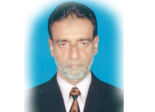
2016 International Conference on Agricultural and Biological Sciences (ABS 2016)
July 23rd - 26th, 2016, Shanghai, China

 |
Prof. Dr. Monir M. El Husseini Director: Center of Biological Control & IPM, Faculty of Agriculture, Cairo University, Egypt |
Speech Title: Man-made Agricultural Pest Problems in Egypt When Ignoring Biodiversity at Desert Land Reclamation Abstract: The previously existing natural balance since thousands of years among fauna and flora in the natural desert ecosystem in Egypt was obviously disturbed by intervention of man reclaiming land for growing monocultured large areas. This intervention led to changes in many food chains resulting sometimes to be in favor of certain insect species to flourish on such monoculture and develops into devastating economic pests. The emerged problem of the rose shafer, Tropinota squalida Scop. (Scarabaeidae : Coleoptera) in the newly reclaimed desert land as serious economic pest on deciduous fruit plantations in the North of Egypt is a classic example for such intervention.More... | |
 |
Prof. Dr. Khalid Javed Chairman, Department of Livestock Production, University of Veterinary and Animal Sciences, Lahore Pakistan |
Speech Title: Recent Advances in Animal Breeding and Genetics Abstract: The ever increasing population of the world will require 70 to 100 % more food by mid of this century, so the animal breeders and geneticists have to adopt some latest interventions to provide improved livestock with little or no impact on environment and animal welfare. Selective breeding has been the source of improvement in livestock but molecular genetic revolution in the last decade of twentieth century led to the emergence of genomics. Molecular genetics did influence the breeding strategies by providing genetic maps, individual genes and QTLs related to performance traits in domestic livestock species. QTLs detection in animals led the shift from conventional selective breeding to marker assisted selection (MAS) and SNPs related to performance traits. Advancements in genomics led the animal breeder to formulate high density SNP chips comprising more than 50,000 to 80,000 SNPs covering the whole genome of livestock species. Selection on the basis of whole genome markers made selection of genetically superior animals at very early age and at the same More... | |
 |
Prof. Dr. Moniruzzaman Khondker Department of Botany, University of Dhaka, Dhaka-1000, Bangladesh |
Speech Title: Changing Environment and the role of plant scientists for sustainable development of Bangladesh Abstract: Environmental change refers to changes in our climate which have been occurring since the beginning of the mid 19th century. In 2015, atmospheric CO2 exceeded 400 ppm and average air temperature (January-September) of the world has reached 1.03°C crossing its 1°C boundary. Sea level rise has been predicted 1 m by 2100. Bangladesh is predominantly a deltaic country with extensive monoculture of Oryza sativa L. With current sea level rise projections, 16% of the land of Bangladesh would be submerged affecting 15% of the total population. Plants contribute more than 90% of dry matter of human food. Security in food production, shelter, bio-energy and the supply of plant oriented medicinal raw materials are key factors for sustainable development. Plant scientists of Bangladesh in collaboration of agriculturist have been trying to develop salt and drought resistant varieties of O. sativa. Besides, introduction of high yielding varieties of non-traditional cereals, vegetables, fruits have also been undertaken. So far success has been achieved in the production of Solanum tuberosum L., Triticum aestivum L., Zea mays subsp. mays L. and Fragaria sp. Coastal afforestation, reducing deforestation and promoting marine ranching and seaweed cultivation have been included as main agenda for the plant scientists of Bangladesh. | |